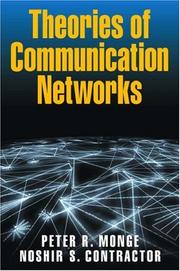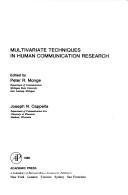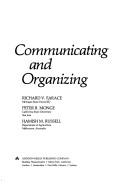| Listing 1 - 5 of 5 |
Sort by
|
Book
Abstract | Keywords | Export | Availability | Bookmark
 Loading...
Loading...Choose an application
- Reference Manager
- EndNote
- RefWorks (Direct export to RefWorks)

ISBN: 0195160363 0195160371 Year: 2003 Publisher: Oxford ; New York : Oxford University Press,
Abstract | Keywords | Export | Availability | Bookmark
 Loading...
Loading...Choose an application
- Reference Manager
- EndNote
- RefWorks (Direct export to RefWorks)
To date, most network research contains one or more of five major problems. First, it tends to be atheoretical, ignoring the various social theories that contain network implications. Second, it explores single levels of analysis rather than the multiple levels out of which most networks are comprised. Third, network analysis has employed very little the insights from contemporary complex systems analysis and computer simulations. Foruth, it typically uses descriptive rather than inferential statistics, thus robbing it of the ability to make claims about the larger universe of networks. Finally, almost all the research is static and cross-sectional rather than dynamic. Theories of Communication Networks presents solutions to all five problems. The authors develop a multitheoretical model that relates different social science theories with different network properties. This model is multilevel, providing a network decomposition that applies the various social theories to all network levels: individuals, dyads, triples, groups, and the entire network. The book then establishes a model from the perspective of complex adaptive systems and demonstrates how to use Blanche, an agent-based network computer simulation environment, to generate and test network theories and hypotheses. It presents recent developments in network statistical anlysis, the p* family, which provides a basis for valid multilevel statistical inferences regarding networks. Finally, it shows how to relate communication networks to other networks, thus providing the basis in conjunction with computer simulations to study the emergence of dynamic organizational networks.
Communication --- Interpersonal communication. --- Social interaction. --- Social perception. --- Social aspects. --- Interaction sociale --- Communication interpersonnelle --- Perception sociale --- Aspect social

ISBN: 0197565638 0199882894 9786610838196 1280838191 019803637X 9780198036371 9780195160369 0195160363 9780195160376 0195160371 9781280838194 0195160363 0195160371 Year: 2003 Publisher: Oxford ; New York : Oxford University Press,
Abstract | Keywords | Export | Availability | Bookmark
 Loading...
Loading...Choose an application
- Reference Manager
- EndNote
- RefWorks (Direct export to RefWorks)
1. Networks and Flows in Organizational Communication. Part I: The Multitheoretical, Multilevel Framework. 2. Network Concepts, Measures, and the Multitheoretical, Multilevel Analytical Framework. 3. Communication and Knowledge Networks as Complex Systems. 4. Computational Modeling of Networks. Part II: Social Theories for Studying Communication Networks. 5. Theories of Self-Interest and Collective Action. 6. Contagion, Semantic, and Cognitive Theories. 7. Exchange and Dependency Theories. 8. Homophily, Proximity, and Social Support Theories. 9. Evolutionary and Coevolutionary Theories. Part I
Social interaction. --- Interpersonal communication. --- Communication --- Social perception. --- Cognition, Social --- Interpersonal perception --- Social cognition --- Interpersonal relations --- Perception --- Social cognitive theory --- Communication and culture --- Human interaction --- Interaction, Social --- Symbolic interaction --- Exchange theory (Sociology) --- Psychology --- Social psychology --- Social aspects.

ISBN: 012504450X 9780125044509 Year: 1980 Publisher: New York (N.Y.) Academic press
Abstract | Keywords | Export | Availability | Bookmark
 Loading...
Loading...Choose an application
- Reference Manager
- EndNote
- RefWorks (Direct export to RefWorks)
Communication --- Multivariate analysis --- Analyse multivariée --- Statistical methods --- Research --- Recherche --- Communications research --- 316.77 --- 303 --- -Communications research --- #SBIB:309H02 --- Communication, Primitive --- Mass communication --- Sociology --- Communicatiesociologie --- Methoden bij sociaalwetenschappelijk onderzoek --- Communicatiewetenschap: algemeen --- Communications research. --- Statistical methods. --- 303 Methoden bij sociaalwetenschappelijk onderzoek --- 316.77 Communicatiesociologie --- Analyse multivariée --- Communication - Statistical methods

ISBN: 0201019809 Year: 1977 Publisher: Reading, Mass. Addison-Wesley
Abstract | Keywords | Export | Availability | Bookmark
 Loading...
Loading...Choose an application
- Reference Manager
- EndNote
- RefWorks (Direct export to RefWorks)
Communication in organizations --- #SBIB:309H251 --- 65.01 --- 65.01 Methods and methodology. Theory and practice of organization --- Methods and methodology. Theory and practice of organization --- Organizational communication --- Organization --- Interne communicatie en organisatie --- Organization theory --- Mass communications
| Listing 1 - 5 of 5 |
Sort by
|

 Search
Search Feedback
Feedback About UniCat
About UniCat  Help
Help News
News